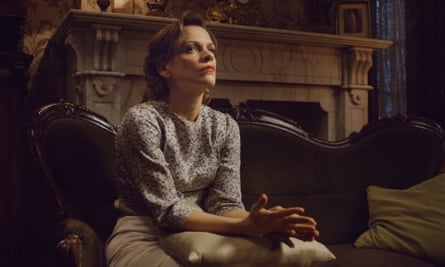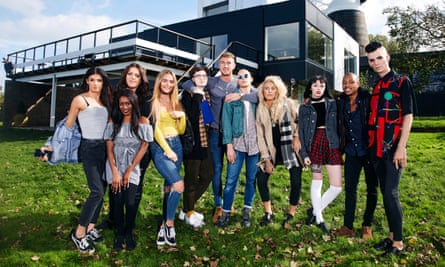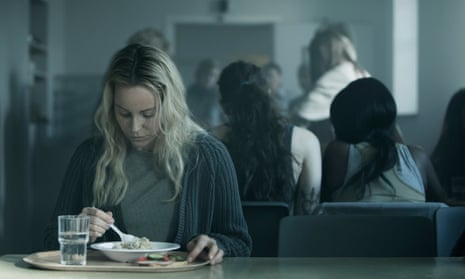The Bridge (BBC Two) | iPlayer
Tabula Rasa (C4) | All 4
Homeland (C4) | All 4
Genderquake (C4) | All 4
Who Wants to Be a Millionaire? (ITV) | ITV Hub
I felt this week as heart-sorry for a beautiful, blond, Porsche-driving policewoman as I hope I am ever likely to feel. The Bridge’s Saga Norén – brusque, frigid of spirit, relentless and heroically on the Asperger’s spectrum, yet whose bitterly rare smile, her even rarer attempt at a joke, can make one feel seven long months of winter have finally ended – has inchwormed her way into our psyches over the past six years. So it was a shocker to see her banged up in chokey, falsely convicted of her mother’s murder at the close of the last series, having lost everything. Almost wailing to her partner Henrik (formerly in the police sense, now in the progressive-Scandi-jail bed sense too), after he tries to mention her routines: “But they’re not my routines. Somebody else decides everything.” For someone so used to control, this is indeed an appalling wrench; but, worse, she’s no longer in the police, a status of sorts on which she had built her entire identity. And for someone who has lived her life by unceasing truth-telling, to the extent that she dobbed in lovely partner Martin, there’s a savage irony in her being wrongly imprisoned.
Saga, it will come as no surprise, survives. Actor Sofia Helin, on the news that her conviction has been quashed, gives a quiet masterclass in repressed relief: a shuddered sigh in silhouette, tight eyes, trembling mouth. Less is more speaks volumes. But it’s not all about Saga, though she will go through many emotional catharses this series, tragically the last ever: Henrik, teamed with a regressively non-PC cop Jonas – we’ve learned throughout the whole series that Danes generally regard Swedes as hideously PC; as we’ve learned that they pronounce “Saga” differently – is off investigating the first, particularly horrid, example of what’s bound to become a grim little series of murders.
One of the supreme strengths of The Bridge is the quality of acting throughout. There are many little diversions – a journalist with a dodgy identical twin; a couple of teen pickpockets; an abusive father; Henrik’s support group; a deported immigrant – but no scene or character ever feels jerry-built with gaffer tape, even (perhaps especially) the most cochineal of red herrings. Yet our eyes constantly, when they’re not drawn to that astonishing bridge, are drawn to policewoman Saga (or, as Jeremy Clarkson wittily called one Millionaire contestant last week, “a policeman woman”; the wit dwindled a little with constant repetition). How we’ll bloody miss her and her olive Porsche 911S and her sad eyes.
To Belgium, then, for our next helping of Walter Presents. Tabula Rasa, hot off of Netflix, is a disarmingly good psychological chiller about an amnesiac witness, which has echoes of those fine 50s films about a blind/damaged/amnesiac women disbelieved by all around her. It’s proper spooky, too, not (thankfully) Woman in White bad-spooky but modernly unsettling: I physically jumped a couple of times. And, yes, there is a stock haunted house straight out of Scooby-Doo, but you also get to see a lot of Belgium that you never normally see, and Belgians that you never see, and never know when anyone’s lying to you.

Homeland ended its best series yet, and there was another shocker, also happening to a sort-of-cop, also female. I am conscious that some have simply stopped watching this, but I’d humbly suggest for quite misguided reasons: the plots might be borderline ludicrous, the spy shenanigans still laughably unlikely, but, post-Trump, who can be at all sure? Cast and production still take it seriously, believe in it, and this comes across with every minute’s viewing. If you only watch one series watch this one just finished, not least for credible explorations of a White House mired in paranoia and Russian post-truth meddling. And to watch Carrie stumbling out after months of being denied her meds in a Russian jail, and Saul’s eyes widening in the dark on a chill Estonian border at the extent of her descent from sanity, is to experience a frisson of horror like few others.
Channel 4 deserves credit for wading into the piranha-infested waters of the gender/trans debate with two successive nights of Genderquake, even if the station hardly covered itself with glory in the subsequent debate.
There was much good in Genderquake, a kind of Big Brother gone right (relatively few screaming drama divas) for a nice enough selection of bi, trans, cis and non-binary youngsters in a big house together for a week. Not least the fact that this outsider realised they, the insiders, were at least as confused when it comes to gender fluidity as me. What muddy waters, what early days… despite a couple of fierce disagreements, this was a surprisingly uplifting experiment, and they all seemed to enjoy themselves, even fall a little bit in love. As brave, smiley Brooke put it, late on: “I love being ‘normal’. It just feels great being part of a group.” A group together, if momentarily, against the catcalls of the outside world, and I learned much, though surely not nearly enough, about the travails – the traumas of dysmorphia, the pain of surgery, the years of ostracism – that most in the house had suffered.

The catcalls of the outside world were permitted mob-like free rein on the subsequent live Channel 4 debate, which was all but closed down thanks to shouted insults from a couple of chortling radical feminists. Caitlyn Jenner spoke well, if too often, in a why-can’t-we-all-just-love-each-other? way, and Sarah Ditum made one of the most interesting points of the interrupty night: that between 50% and 80% of youngsters who present as trans don’t go on to transition, ie change their minds later, when they know them. But Cathy Newman, rather than getting all do-you-apologise, do-you-regret? with poor old Germaine Greer (and I notice Newman didn’t at all latch on to Munroe Bergdorf for her “all white people are racist” rant), should have surely saved her tongue-lashing for the audience.
I couldn’t help wondering whether the shouty rad-feminist wandered off afterwards to the pub arm in arm with the bloke proudly wearing an “I AM A MAN” T-shirt. After all, doesn’t it just feel great being part of a group? Even a group fuelled by spittle-flecked hatred!
Despite what I said about Clarkson earlier, he was a surprisingly good host of the week’s 20th-anniversary tributes to Who Wants to Be a Millionaire? Warm, human, drily funny, kind to contestants… we’ll make a grown man out of you yet, Jeremy. The main surprise was the contestants and the answers. Have we really, despite Google, grown that much dumber in 20 years?

Comments (…)
Sign in or create your Guardian account to join the discussion